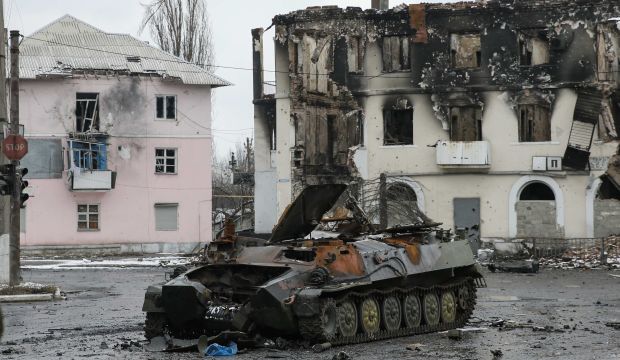
Buildings and armored vehicles were destroyed during battles between separatist rebels and the Ukrainian army in Vuhlehirsk, Donetsk region, on February 4, 2015. (Reuters/Maxim Shemetov)
Berlin, AP—French President Francois Hollande says all parties pushing for a new peace plan for eastern Ukraine see a ceasefire as the first step but must go further to find a lasting accord.
Hollande spoke Friday before he and German Chancellor Angela Merkel headed to Moscow to discuss a new European peace plan with Russian President Vladimir Putin. The top-level diplomatic dash came a day after Merkel and Hollande met with the Ukrainian government in Kiev to discuss how to salvage a peace plan agreed upon last year in Minsk, Belarus.
“Everyone is aware that the first step must be the ceasefire, but that it cannot suffice. We must seek a global solution,” Hollande told journalists in Paris before heading to the airport. “We should have hope [in this new initiative].”
Even getting the arms to fall silent would be a significant diplomatic breakthrough. Fighting between Russian-backed rebels and the government in Kiev has surged in the last month in eastern Ukraine, fueling fears the conflict is threatening Europe’s overall security.
Russia has vehemently denied backing the rebels with troops and weapons but the top NATO commander, US Air Force Gen. Philip Breedlove, said Thursday that Russia continues to supply the separatists with heavy, state-of-the-art weapons, air defenses and fighters.
In Berlin, Merkel said she and Hollander would use “all our power with direct visits to Kiev and to Moscow today to stop the bloodshed as soon as possible and to fill the Minsk agreement with life.”
She rejected reports that she and Hollande were prepared to offer more territory to the Ukraine separatists, adding that “I will never deal with territorial questions over another country.”
The diplomatic blitz comes amid fierce fighting that prompted Washington to consider providing the beleaguered Ukrainian military with lethal weapons, an option that Germany and other European nations reject.
“We are convinced that there’s no military solution to this conflict,” Merkel added. “But we also know that it’s completely open whether we will manage to achieve a ceasefire with these talks. We don’t know if this will happen today or whether further talks are necessary, whether these will be long or short talks in Moscow.”
Merkel told reporters that she and Hollande are traveling in a bid to safeguard “national self-determination, which is part of the European order.”
On the ground in eastern Ukraine, the rebels and the Ukrainian authorities agreed Friday on a humanitarian corridor to evacuate civilians from the epicenter of the fighting, Debaltseve, a key railway hub between the two main rebel-controlled cities of Donetsk and Luhansk.
A local ceasefire held as a convoy of several dozen buses drove from nearby Vuhlehirsk toward Debaltseve, where residents have been trapped in crossfire and left without power, heating or running water for almost two weeks.
But artillery duels between the rebels and government forces still rumbled through Donetsk, where one disenchanted resident had little hope for the success of the new European peace initiative.
“I don’t expect anything, I’m so tired of this, it has been going on for so long,” said retiree Esfira Papunova.
